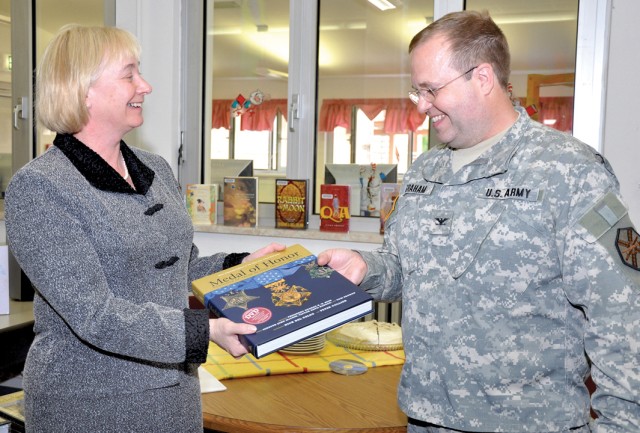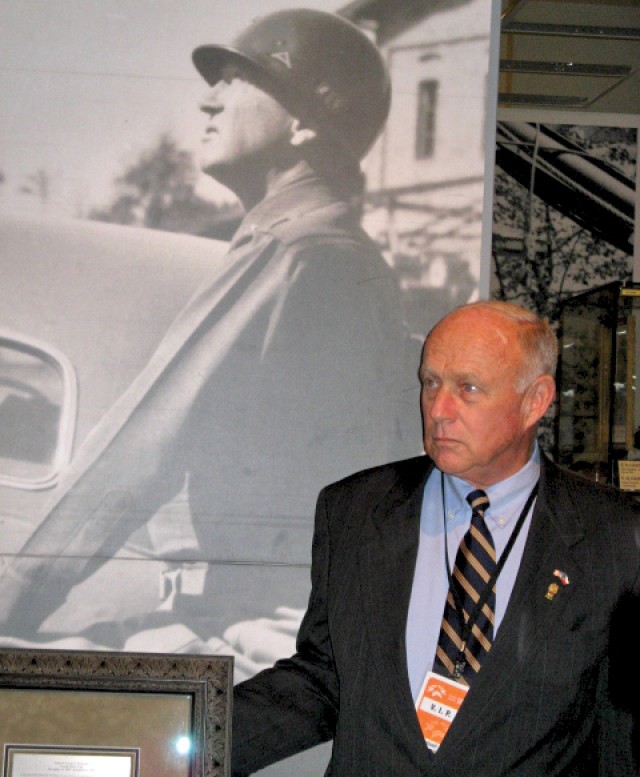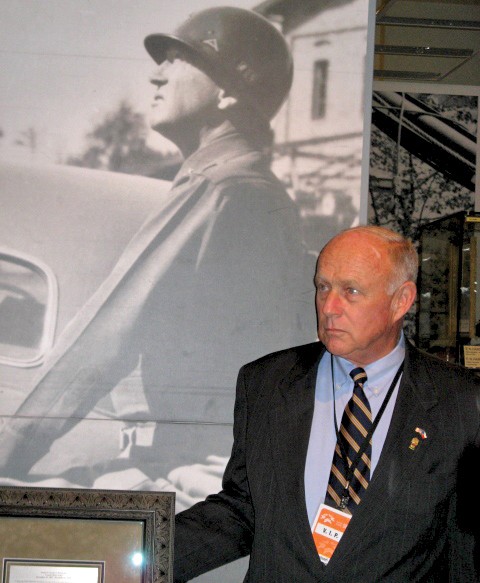"Nobody signs up to win the Medal of Honor. You earn it at the intersection of happenstance and hell, and you're there because that's what your country has asked of you."
- from "Medal of Honor - Portraits of Valor Beyond the Call of Duty"
WIESBADEN, Germany - "To all who serve, thank you for your dedication and support of America, and the freedom you are securing by your individual contribution."
With those words on a signed letter from George Patton Waters, grandson of Gen. George S. Patton, more than 15 copies of the illustrated book "Medal of Honor - Portraits of Valor Beyond the Call of Duty" were handed over to Col. Ray Graham, U.S. Army Garrison Wiesbaden commander at the Wiesbaden Library May 8. Graham accepted the books from Christine Havlik, a retired Department of Defense Dependents Schools teacher who met Waters at a World War II commemorative event in Pilsen, Czech Republic.
"It's very important to him to keep the legacy of his grandfather alive," said Havlik, explaining that as a member of the Congressional Medal of Honor Foundation, Waters donated the books to Army libraries to "educate and raise awareness about what the Medal of Honor is all about. ... He wanted to give them to service members in Germany."
Turning the pages of the coffee table-size book, one encounters some of the more than 500 Medal of Honor recipients since the start of World War II. Period photos and more current portraits by photographer Nick Del Calzo accompany the stories of brave deeds and heroism in combat depicted by writer Peter Collier.
Among the 139 still living and deceased men featured one can read about Sgt. 1st Class Paul R. Smith of the 11th Engineer Battalion who helped defend Baghdad Airport and his comrades in April 2003 before being killed by Iraqi Republican Guard fire; Delta Force Sergeants Randall Shugart and Gary Gordon who were killed saving American service members in Mogadishu, Somalia, in October 1993 and Sp4 John P. Baca, a member of the 12th Cavalry, 1st Cavalry Division, who threw his helmet over a hand grenade to save his fellow soldiers in Vietnam and survived.
One can also read about men such as 1st Lt. Vernon Baker, a member of the segregated 320th Regiment, 92nd Infantry Division - the first black unit to go into combat in World War II - who received the Medal of Honor from President Bill Clinton some 50 years after performing heroic acts on the battlefield in Italy during the second world war. Other men included among the portraits of valor include helicopter pilots, Marines, sailors and Japanese Americans who had to fight prejudice and suspicion following the bombing of Pearl Harbor to serve in the U.S. military but still went on to risk their lives time and time again to help save their comrades' lives on the field of battle.
While more than 60 percent of the Medals of Honor awarded since World War II went to service members who never made it back from the carnage of war, nearly two dozen recipients went on to serve in Congress. Among the men featured are America's first Japanese American Congressman Daniel K. Inouye, recognized for his actions with the 442nd Regimental Combat Team in Italy during World War II, and Nebraska Senator Joseph "Bob" Kerrey recognized for his heroism as a Navy SEAL in the Mekong Delta in Vietnam in 1969.
One is reminded that despite hardships and seemingly insurmountable odds, Medal of Honor recipients rose to perform deeds worthy of legend.
"The medal of honor is emblematic of one individual's willingness to put everything at risk to save a comrade, drive back the enemy, hold a position," writes Collier. "Those who wear it emboss the abstract ideal of courage with a specific face, a name and character, a deed that gives momentary clarity to the chaos of battle."
Joyce Greene, USAG Wiesbaden community librarian, explained that besides including the book in its collection, it would be featured in a special Memorial Day display at the library.
Michael McNulty, education and outreach librarian at the European Regional Library Service Center in Heidelberg, was on hand during the book handover in Wiesbaden to accept the additional copies, each with a signed letter from Waters, to be distributed to other community libraries in Germany.




Social Sharing